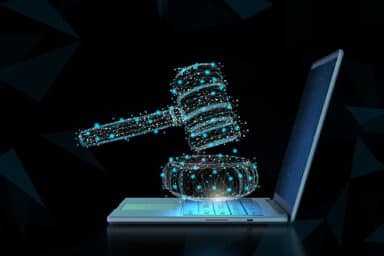Top 6 AI Legal Issues and Concerns for Legal Practitioners
By Mary Elizabeth Hammond
May 10, 2024
| 7 min read
In this digital age, the practice of law looks a bit different. Integrating artificial intelligence (AI) and generative artificial intelligence (GAI) is becoming more and more common—presenting both opportunities and challenges for legal practitioners. Many industries are wrestling with the complex AI legal issues that come with adopting this new technology, and while concerns about ethical implications persist, AI is undeniably a useful tool. But as AI innovation and adoption continue to evolve—what is its role in the legal profession?
In this article, we’ll aim to make AI adoption easier for legal professionals by addressing the top AI and generative AI legal issues lawyers should consider. We’ll cover:
- AI impact on legal jobs and adoption among the profession
- AI legal issues and the top concerns for AI in law
- Ethical rules from the American Bar Association (ABA) to consider
AI Today in the Legal Profession
It’s clear legal innovation with AI is here to stay, but how it impacts the legal industry remains to be seen. According to the 2023 Bloomberg Law’s Legal Ops + Tech Survey, 50% of respondents are “somewhat” or “very concerned” about the ethical implications of using AI in their practice.
However, this trust gap doesn’t seem to be slowing down adoption. AI trends in the legal industry are only gaining momentum. The Future Ready Lawyer 2023 survey, which surveyed over 700 legal professionals, found that 73% of respondents expect to integrate generative AI into their legal work within the next twelve months.
Additionally, when surveying legal professionals about their familiarity with AI, the MyCase and LawPay 2024 Legal Industry Report found that:
- 73% of respondents report at least some familiarity with AI, highlighting its pervasive impact on the industry. Solo practitioners appear slightly more attuned to the nuances of AI, with 26% claiming to be very familiar, as opposed to 21% from mid-sized firms (6-20 attorneys)
- 63% of the legal professionals surveyed reported being somewhat or very familiar with the concept of GAI. Of those respondents, 41% were ‘somewhat familiar’ with GAI, accentuating the increasing awareness of this specific AI application within the legal field.


Top 6 AI Issues and Concerns for Lawyers
1. Client Confidentiality
AI is still in its infancy, which is why carefully vetting providers is essential to address concerns about data privacy and third-party sharing. These AI legal issues can result in liability issues, cyber-breaches, and jeopardize client confidentiality. Carefully choose the AI software provider your firm relies on and ensure it has taken the necessary security steps to preserve client confidentiality.
2. Data Security
Legal professionals deal with sensitive client information, and sharing that with third-party software, such as an AI tool, can put the data at risk and even breach privacy laws. Ensure that any software provider with which you trust your clients’ data has been properly vetted and has robust security measures and practices in place.
3. Output Accuracy
Another top artificial intelligence legal issue is output accuracy. AI-generated content is not always accurate and can include false information, referred to as “hallucinations.’ Any AI-generated content should be meticulously reviewed and edited by a legal professional before it is utilized for a case.
In one June 2023 personal injury case, a lawyer relied on ChatGPT to prepare a filing but was reprimanded when the brief he provided referenced false case citations. This was but one example of many where “AI hallucinations” have been submitted to courts, negatively impacting the judicial process. Understanding ChatGPT for law firms and how to use it properly can make all the difference and avoid these missteps.
In response to this instance and other generative AI mishaps, a federal judge in the Northern District of Texas issued a standing order requiring anyone appearing before the court to either “attest that no portion of any filing will be drafted by generative artificial intelligence” or cite all language that was drafted by GAI.
4. Output Bias
According to our 2024 Legal Industry Report, the “high potential for hiding human biases under the veil of an unaccountable algorithm” was cited as a top hesitation for adopting AI.
Because AI is developed by human programmers, there is a risk that human biases and algorithmic errors could impact the output of AI systems. As explained in an ABA Journal article, “There can be no unbiased AI System. If an organization is designing or using AI systems to make decisions that could potentially be discriminatory under law, attorneys should be involved in the development process alongside data scientists.”
5. Authentication of Evidence
The criminal justice system has also been impacted by AI. According to the National Institute of Justice, law enforcement and prosecutors are utilizing AI and other machine-learning tool outputs as evidence in their cases. AI is used to identify faces, weapons, license plates, and objects at crime scenes. It is also being used in the criminal justice system 1) in live feeds to identify suspicious behavior, 2) to enhance DNA analysis, 3) to determine how likely a defendant is to skip bail, 4) to forecast crime rates, and 5) to process evidence.
This heavy reliance on AI to prosecute crimes can be problematic due to “the black box problem.” As described in an article from The Hill, trade secret laws prevent the public from obtaining information on how and when AI is being used, along with how these tools work. Furthermore, public officials relying on this technology cannot confirm that the AI output is reliable and unbiased.
To ensure “proper controls,” The National Institute for Standards and Technology (NIST) has released an AI Risk Management Framework, including a Trustworthy & Responsible Artificial Intelligence Resource Center.
6. Job Displacement
Another concern is that AI may impact job security. Many legal professionals understandably fear the risk of job displacement. The good news is that in its current state, AI cannot yet replace human reasoning, empathy, and ethics. Instead, AI is best used as a tool, not a replacement. As discussed above, AI-generated content may include biased, false, and unreliable information and must be reviewed by a knowledgeable legal professional.
The Ethical Duty of Technology Competence
To help lawyers maintain ethical standards in their practice, The American Bar Association’s Model Rules of Professional Conduct provide guidance. Rule 1.1 mandates that lawyers provide competent representation to their clients, and Comment 8 extends the duty of competence to include keeping abreast of relevant technologies. Considering AI’s rapid adoption rate in the legal profession, there is the potential for its use to become a standard practice in the profession. Accordingly, technology competence requires lawyers to have a basic understanding of AI and how it may impact the practice of law.
Authors of the book AI and Legal Ethics: What Lawyers Need to Know cited AI as the single most relevant technology of our time. They advised, “Lawyers may therefore find themselves in an increasingly fraught situation, where the ethical rules encourage use of AI, but also impose discipline for the various ways it can be misused.”
Due to the many legal issues with AI in the profession, lawyers must tread carefully to ensure compliance with legal ethics and confidentiality obligations. Utilizing AI for tasks like legal research or creating document templates can streamline processes, but lawyers must ensure that the output is accurate, reliable, and secure. Moreover, lawyers should be mindful of biases inherent in AI algorithms, particularly in sensitive areas such as criminal justice, to prevent unjust outcomes.
Final Notes
Despite all of the legal and ethical issues in artificial intelligence, when used well, AI can be a great aid to the legal profession. For example, in areas like contract analysis, AI-powered tools can swiftly review vast amounts of data to identify relevant clauses and potential risks.
By leveraging emerging legal AI tech responsibly, lawyers can enhance their efficiency, freeing up their time to better serve their clients. MyCase IQ’s secure legal AI software was designed specifically for the legal profession and can empower your firm to:
- Enhance writing and ease client communication: Utilize text editing AI to detect and fix grammatical errors and adjust tone. And soon, you will be able to translate messages from English to other languages.
- Save valuable time and get the information you need: Input legal documents to MyCase IQ and receive concise summaries right in MyCase.
Learn more about MyCase and how your firm can safely and securely streamline practice management with AI. Book a custom demo to see how it works.


